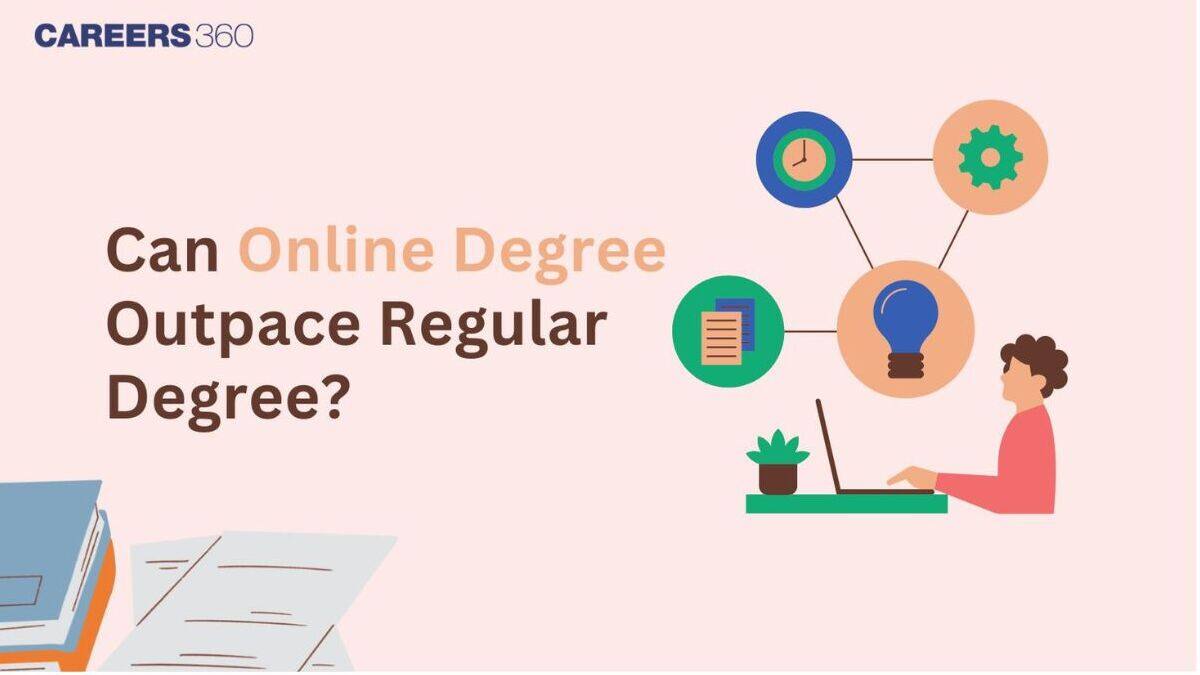Navrachana University BBA Admissions 2026
Ranked as the 3rd Best Private University in Gujarat by Education World
Anyone nowadays can access education from anywhere in the world with the growth of online learning. Several top universities offer online degree courses at undergraduate and postgraduate levels in diverse domains. But the question arises, can an online course outpace or compete with regular degrees? Do online degree courses have the same value as traditional courses?

An online degree is quite similar to a traditional degree in terms of curriculum and course outcomes. The mode of delivery differentiates these courses from each other. Online degree courses are fully conducted in virtual modes, and there is no requirement to attend in-person classes like traditional courses.
While on-campus courses provide structured modules of education where students get hands-on learning experience, online courses help students in career enhancement without putting their jobs on hold. Read this article to know the key difference between online vs offline degrees, are they competing with each other, and their pros and cons.
Online degree courses and offline courses are both UGC-recognised and approved by the employer. These programmes offer quality education, however, their goals and audiences are different. Online degree courses are best for remote students and working professionals, as they are not able to join in-person classes but want to gain knowledge and skills.
Offline or traditional college degree courses are ideal for students seeking hands-on learning through regular classroom interactions with peers and professors. While online and offline degree courses share some similarities, they also differ significantly. Each mode has its own pros and cons, thus, students should choose based on their preferences, goals, and availability.
Also Read: Can I Apply for Jobs at MNCs with an Online Degree?
The following table highlights the quick differences between online degree and a regular degree.
Particulars | Online Degree | Regular Degree |
|---|---|---|
Flexibility | More flexible and self-paced learning | Fixed schedules, require attendance and commitment |
Cost | More affordable and saves money on commuting or campus facilities. | Comparatively expensive and expenses on tuition fees and living costs. |
Networking | Limited interaction but a global network opportunity | More networking opportunities with fellow students, professors, and alumni |
Recognition | Government-accredited and recognised by employers. | Holds government recognition and is valued by employers. |
Learning Methodology | Live classes, recorded lectures, and digital learning resources. | Classroom learning, structured curriculum, hands-on learning, and physical learning resources. |
Also Read: Can Online Degree Programs Help Get Into Management Roles at Deloitte?
Online degree courses are offered in a completely virtual mode. These courses are delivered through live lectures, recorded sessions, online study material, case studies, and assignments. Exams for online courses are held in a technology-enabled, online-proctored mode. Online degree courses come with flexibility, accessibility, and affordability.
The comparison between online and offline degrees is not about which course is better. It is about the suitability of the course. Students must choose to pursue a course as per their convenience and affordability. In regular degree courses, students require physical presence, while in online courses they can study at their convenience.
Frequently Asked Questions (FAQs)
Yes, as online degree courses are recognised by UGC, they hold the same values as traditional courses and provide the same quality of education.
Yes, UGC-approved online degree courses are accepted for various careers in India and abroad, including both private and government jobs.
The duration of online degrees at the UG level is three years, whereas online PG courses last two years.
Yes, several foreign universities accept online degrees from accredited universities. Employers also value an online degree if it is earned from a recognised university.
Yes, online degrees are UGC approved. Students should check the college and their programmes whether it is approved by UGC.
On Question asked by student community
There are several government and private colleges in India offering UGC-recognised Online MBA. Some of which are as follows:
Here are some useful article links for more read :
UGC Approved Online MBA Colleges in India 2026: Complete List, Fees,
There are several cheapest online MBA options like:
Visit the links for more details :
Anyone who has completed a bachelor's degree is eligible for Online MBA . For some online MBA courses, especially for Executive MBA, you will require at least 2-3 years of relevant work experience and sometimes a valid CAT, MAT, or GMAT score.
For more, read Online MBA Admission: Eligibility, Selection
Yes, an online MBA degree is UGC-recognised which making it highly relevant in 2026. It holds the same value and credibility as a on-campus programme. Due to its flexible nature, working professionals and graduates prefer an MBA in online, flexible mode to upskill themselves while working.
It’s not available everywhere — you need to target states/institutions that officially recognize the KM quota for MBA admissions.
Some examples of MBA colleges with Kashmiri migrant quota-
1-symbiosis Institute of Business Management (SIBM), Pune
2-FORE School of Management, Delhi
3-Central University of Odisha (Koraput)
Ranked among top 10 B-Schools in India by multiple publications | Top Recruiters-Google, MicKinsey, Amazon, BCG & many more.
Among top 100 Universities Globally in the Times Higher Education (THE) Interdisciplinary Science Rankings 2026
NAAC A++ Accredited | Ranked #12 by NIRF
Applications Deadline - 23rd March 2026 | Offers full-time PGP in International Master in business (IMB) Equivalent to MBA under following specializations Marketing, HR, Operations, and many more
Extended Application Deadline: 15th Feb | Globally Recognized by AACSB (US) & AMBA (UK) | 17.8 LPA Avg. CTC for PGPM 2025
NAAC A++ Accredited | AMBA & AACSB Member | Highest CTC 16.22 LPA | Merit-based Scholarships | Last Date: 19th Feb'26